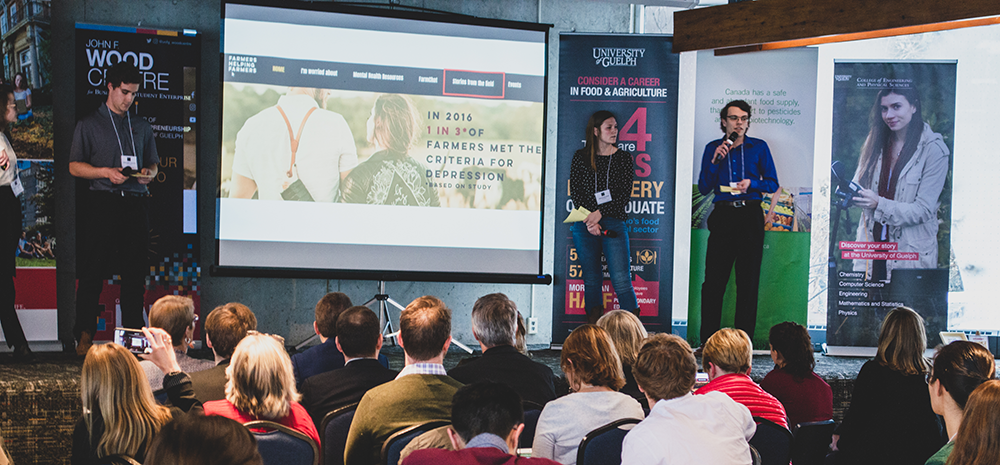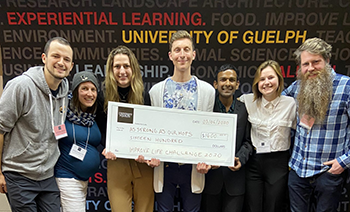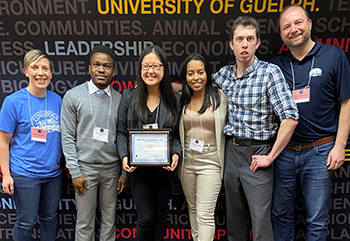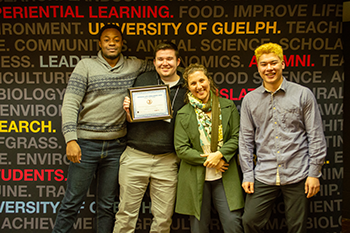Students collaborate to address industry challenges in agriculture

On Friday, March 6th the University of Guelph hosted the third annual Improve Life Challenge, a one-day immersive experience where interdisciplinary student teams work with community partners to develop solutions to real-world problems.
The theme for this year’s Improve Life Challenge was Hack the Farm in a Climate of Change, which focused on challenges facing the agriculture and food sector including aging demographics, advancements in technology, and pressure for sustainable practices.
Several community partners took part in the event to team up with students and provide a problem statement based on real challenges facing their industry. Teams then worked with their community partner to investigate, collaborate, and develop unique solutions to address them.
Community partners included:
- Ontario Ministry of Agriculture, Food and Rural Affairs
- Beef Farmers of Ontario
- Maple Lodge Farms
- Conestoga Meats
- The Co-operators
- Highline Mushrooms
- Holland Marsh Growers’ Association
- OCP Group
- Wellington Brewery
“This rich learning opportunity for our students wouldn’t be possible without the enthusiasm and commitment from our community partners and the strong alliance of internal partners on campus,” said Erin Doherty, Program Manager at the John F. Wood Centre for Business and Student Enterprise. “The Improve Life Challenge provides an opportunity to work across disciplines and collaborate on real challenges facing industry.”
The competition included students from all colleges at the University of Guelph, creating an environment that harnessed the power of interdisciplinary collaboration and heightened the innovation and range of idea generation.
At the end of the day, teams had the opportunity to pitch their solutions to a panel of judges for a chance to win cash prizes. Students were graded on several aspects of their pitch, including their analysis of the problem, the impact and feasibility of their solution, and their overall presentation skills.
“I enjoyed being a judge and being involved in Hack the Farm because it is an opportunity for students to work collaboratively on real world problems which develops their foundational skills,” said Rene Van Acker, Dean of the Ontario Agricultural College at the University of Guelph. “The students at Hack the Farm showed how outstanding they are in being able to present strong, creative and feasible solutions to complex Agri-food industry problems by working together for just one day! The performance of our students gives me so much hope for our future.”
Congratulations to the top three teams:
First Place ($1,600): Wellington Brewery
Wellington Brewery tasked students with the challenge of designing processes that reduce the company's environmental impact and positively contribute to the community.
The team designed a solution for cleaner production by addressing technical barriers in their waste water process while also providing opportunities for partnership in promoting the circular economy.

Second place ($800): Conestoga Meats
Conestoga Meats tasked students with the challenge of improving their packaging from a sustainability perspective.
The team proposed both short and long-term solutions including the design of a belt system for shipping products, consumer education campaigns, and the proposal of compostable bioplastics for packaging.

Third place ($400): Highline Mushrooms Team 2
Highline Mushrooms tasked students with looking for innovative ways of using spent compost while supporting their community and industry.
The team proposed using anaerobic digestion to create higher quality compost that allows nutrients to be more readily available while also producing a gas that could power Highline Mushroom’s facilities, creating a renewable energy source for the operation.

Special thank you to all the community partners who participated this year to make the event possible.
New this year community partners have the opportunity to implement the solutions proposed by their student team through an internship. Applications for these internships are now open and successful candidates will be selected by the end of March 2020 to continue working on their projects.
Learn more about the Improve Life Challenge
The Improve Life Challenge 2020: Hack the Farm in a Climate of Change was organized by several groups on campus, including: the College of Engineering and Physical Sciences, the Ontario Agricultural College, the John F. Wood Centre for Business and Student Enterprise, the Gordon S. Lang School of Business and Economics,the Arrell Food Institute, the Research Innovation Office, and the Community Engaged Scholarship Institute.